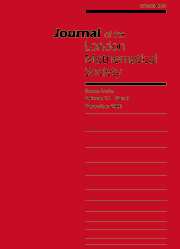Article contents
TENSOR PRODUCTS OF C*-ALGEBRAS OVER ABELIAN SUBALGEBRAS
Published online by Cambridge University Press: 01 February 1997
Abstract
Suppose that A is a C*-algebra and C is a unital abelian C*-subalgebra which is isomorphic to a unital subalgebra of the centre of M(A), the multiplier algebra of A. Letting Ω = Ĉ, so that we may write C = C(Ω), we call A a C(Ω)-algebra (following Blanchard [7]). Suppose that B is another C(Ω)-algebra, then we form A[otimes ]CB, the algebraic tensor product of A with B over C as follows: A [otimes ] B is the algebraic tensor product over [Copf ], IC = {[sum ]ni=1 (fi [otimes ] 1−1[otimes ] fi)x| fi∈C, x∈A[otimes ]B} is the ideal in A[otimes ]B generated by 〈f[otimes ]1−1[otimes ] f|f∈C〉, and A [otimes ]CB = A[otimes ]B/IC. Then A[otimes ]CB is an involutive algebra over [Copf ], and we shall be interested in deciding when A[otimes ]CB is a pre-C*-algebra; that is, when is there a C*-norm on A[otimes ]CB? There is a C*-semi-norm, which we denote by ‖·‖C-min, which is minimal in the sense that it is dominated by any semi-norm whose kernel contains the kernel of ‖·‖C-min. Moreover, if A [otimes ]CB has a C*-norm, then ‖·‖C-min is a C*-norm on A[otimes ]CB. The problem is to decide when ‖·‖C-min is a norm. It was shown by Blanchard [7, Proposition 3.1] that when A and B are continuous fields and C is separable, then ‖·‖C-min is a norm. In this paper we show that ‖·‖C-min is a norm when C is a von Neumann algebra, and then we examine some consequences.
- Type
- Research Article
- Information
- Copyright
- The London Mathematical Society 1997
- 3
- Cited by


